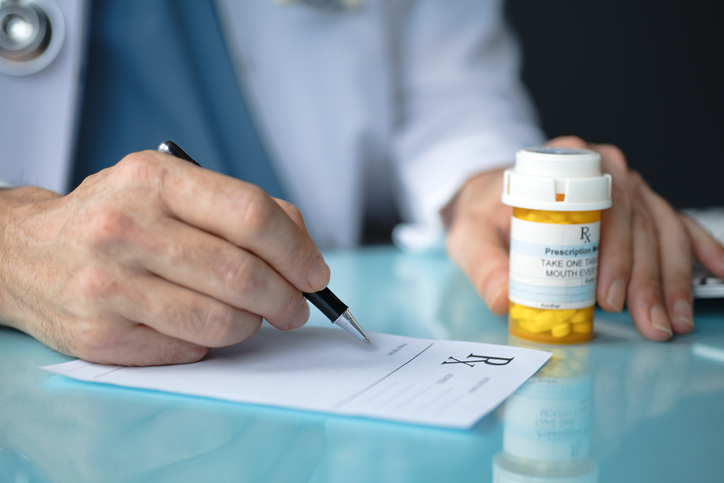Pain
Medication Treatment Options for Irritable Bowel Syndrome (IBS)

What is irritable bowel syndrome (IBS)?
Irritable bowel syndrome (IBS) is a health condition in which the large intestine is affected by a simultaneously occurring group of intestinal symptoms. IBS causes stomach discomfort or pain, diarrhea or constipation, and changes in stool consistency (thin, hard, soft or liquid stools). It affects an estimated 10 to 15 percent of Americans.
Irritable bowel syndrome is also known as spastic colitis, mucous colitis, irritable colon or spastic colon. Although bowel changes occur, the risk of colorectal cancer does not increase with IBS. It is uncommon for intestinal damage to occur with IBS; however, symptoms may significantly alter one's lifestyle.
Treatment options
Because there is no cure for irritable bowel syndrome, treatment is aimed at relieving symptoms. A dietitian can help with diet changes that may relieve IBS symptoms. “Home remedies” are often suggested prior to medication treatment.
Various over-the-counter and prescription medications are available to help manage the symptoms of irritable bowel syndrome. Whether over-the-counter or prescription, medication treatment options for irritable bowel syndrome should be discussed with a health care professional.
Over-the-counter medications
- Fiber supplements or bulk-forming laxatives, such as psyllium, can help with constipation and should be taken with plenty of fluids. These supplements increase the bulk in the stool, making it easier to pass.
- Stool softeners, such as docusate sodium, help the stool retain more water, resulting in softer bowel movements.
- Hyperosmotic laxatives, such as polyethylene glycol, increase the amount of water in the intestines, keeping stool wet and aiding movement through the intestines.
- Saline laxatives, such as magnesium citrate or hydroxide, work in a similar manner to hyperosmotic laxatives.
- Stimulant laxatives, such as bisacodyl and sennosides, work by stimulating the intestines, which helps stool pass quickly. This medication is not a good long-term option, as the bowels can become dependent on the stimulation to work properly.
- Anti-diarrheal medications, such as loperamide, can ease diarrhea symptoms by slowing down gastrointestinal muscle contractions that lead to diarrhea.
Prescription medications
- Bile acid binders, such as cholestyramine, colestipol and colesevelam, may be prescribed if over-the-counter anti-diarrheal medications do not ease symptoms. This medication works by making bowel movements more solid and less frequent. Possible side effects include bloating, abdominal pain, gas or constipation.
- Anticholinergic medications, such as dicyclomine, may be prescribed for bouts of diarrhea and can help relieve painful bowel spasms. It is also prescribed to treat motion sickness. This medication is typically safe but may cause constipation, dry mouth and blurred vision.
- Tricyclic antidepressants, such as imipramine, nortriptyline and desipramine, may relieve depression symptoms and inhibit neuron activity that controls the intestines. Low dosages may be prescribed if IBS symptoms are present without depression. Possible side effects include blurred vision, dizziness, drowsiness or dry mouth
- Selective serotonin reuptake inhibitors (SSRIs), such as fluoxetine and paroxetine, can ease depression, pain and constipation.
- Anticonvulsant medications, such as gabapentin and pregabalin, may ease IBS-related pain and bloating.
- Linaclotide increases fluid secretion in the small intestine to aid with stool passage. Although this medication may cause diarrhea, taking it 30 to 60 minutes before eating usually helps.
Medications specifically approved for irritable bowel syndrome treatment
The U.S. Food and Drug Administration (FDA) has approved certain prescription medications specifically to relieve symptoms of irritable bowel syndrome. A list of FDA-approved medications include the following:
- Alosetron relaxes the colon and slows waste movement through the lower bowel. It is intended to treat severe cases of IBS with diarrhea in women when other treatments have failed to provide relief. This medication is FDA approved for the treatment of irritable bowel syndrome with diarrhea (IBS-D).
- Eluxadoline increases muscle tone in the rectum while reducing bowel contractions and fluid secretion in the intestines. It is prescribed to ease diarrhea associated with IBS. Possible serious side effects include pancreatitis, abdominal pain, nausea and constipation. This medication is FDA approved for the treatment of irritable bowel syndrome with diarrhea (IBS-D).
- Rifaximin is an antibiotic that may be prescribed to decrease diarrhea and overgrowth of bacteria. This medication is typically taken three times per day for 14 days. Rifaximin is FDA approved for the treatment of irritable bowel syndrome with diarrhea (IBS-D).
- Lubiprostone is generally prescribed only for women who have not responded well to other treatments. It helps with stool passage by increasing fluid secretion in the small intestine. This medication is FDA approved for the treatment of irritable bowel syndrome with constipation (IBS-C).
















